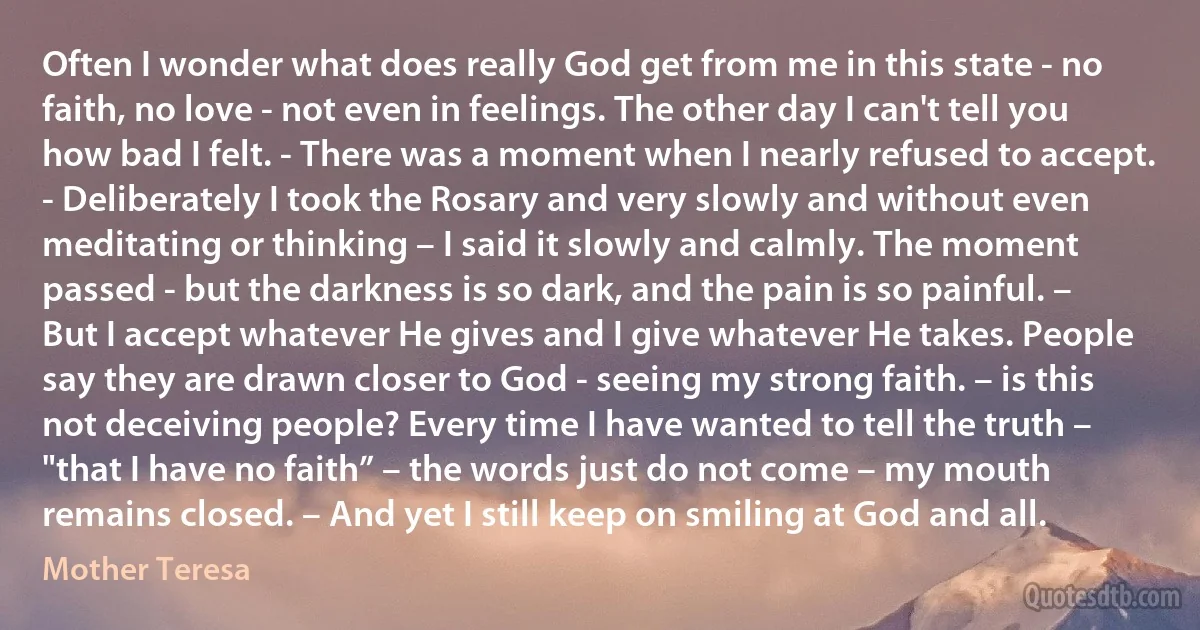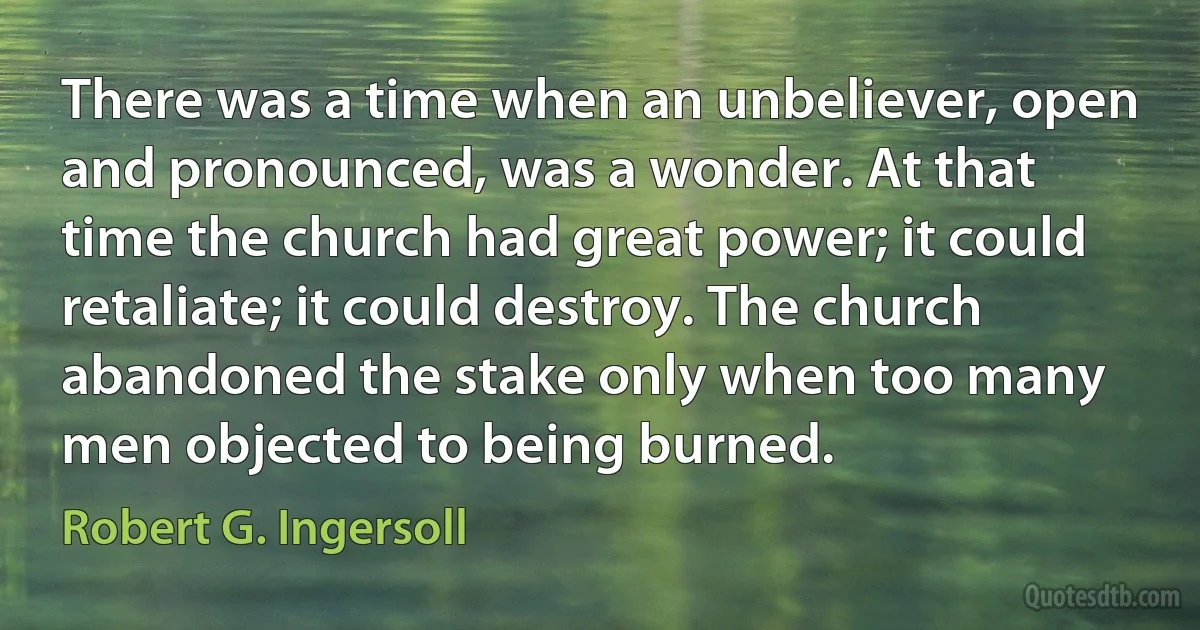Wonder Quotes - page 86
"Breathing in, I calm my body." Reciting this line is like drinking a glass of ice water-you feel the cold, the freshness, permeate your body. When I breathe in and recite this line, I actually feel the breathing calming my body, calming my mind. "Breathing out, I smile." You know the effect of a smile. A smile can relax hundreds of muscles in your face, and relax your nervous system. A smile makes you master of yourself. That is why the Buddhas and bodhisattvas are always smiling. When you smile, you realize the wonder of the smile.

Nhat Hanh
Tell me, suit, don't you wonder if it's all worth it?'
"If what's all worth what?” it says, and I can hear that condescending tone in its voice again.
"You know; living. Is it worth all the... bother?”
"No.”
"No?”
"No, I don't ever wonder about it.”
"Why not?” I'm keeping my questions short as we walk, conserving energy and breath.
"I don't need to wonder about that. It's not important.”
"Not important?”
"It's an irrelevant question. We live; that's enough.

Iain Banks
Ifness pursed his lips judiciously. "All folk, mercantilists as well as tavern-keepers and musicians, try to relate their work to abstract universals. We mercantilists are highly sensitive to theft, which stabs at our very essence. To steal is to acquire goods by a simple, informal, and inexpensive process. To buy identical goods is tedious, irksome, and costly. Is it any wonder that larceny is popular? Nonetheless it voids the mercantilist's reasons for being alive; we regard thieves with the same abhorrence that musicians might feel for a fanatic gang which beat bells and gongs whenever musicians played.”
Frolitz stifled an ejaculation.
Ifness tasted the mug of green cider which Loy had set before him. "To repeat: when a thief steals property he steals life. For a mercantilist I am tolerant of human weakness, and I would not react vigorously to the theft of a day. I would resent the theft of a week; I would kill the thief who stole a year of my life.”.

Jack Vance
There's no use trying to kid myself with cheery little uplifting cliches. I've been forced right up against the underlying truth of things. What a dark and cruel place the world is, for all its beauty, for all its wonder! We have miracles around us on every side-a spiderweb is a miracle, Lora!-but we also have violence, insanity, terrible disease, sudden death. The same Nature that brings us the mountains and the rivers and the green glistening meadows brings us the hurricane, the earthquake, the flood of red-hot lava rolling toward the city.

Robert Silverberg
I sometimes wonder whether hon. Members opposite really have any understanding of what hot industrial fires they are playing with and whether they understand what deep fissures they are driving into our society, at a time when we in this country, of all countries, should be showing how violent tensions can be relieved without violence... When I look across at the benches opposite, not only at the Front Bench but at those behind, it seems to me very often that what they speak for is...a narrow, blinkered, suburban England with no conception whatsoever of industrial Britain.

Michael Foot
What a theme, and what a speech, and what a speaker, and how Oliver Cromwell himself would have been thrilled to hear the parliamentary cause elevated to its rightful pre-eminence... Writing as an impenitent Leveller who still begs to differ with you (and Oliver Cromwell) in so many matters, I still cannot withhold my wonder and excitement at what I heard there today.

Enoch Powell
Most of our literature and social philosophy after 1850 was the voice of freedom against authority, of the child against the parent, of the pupil against the teacher. Through many years I shared in that individualistic revolt. I do not regret it; it is the function of youth to defend liberty and innovation, of the old to defend order and tradition, and of middle age to find a middle way. But now that I too am old, I wonder whether the battle I fought was not too completely won. Let us say humbly but publicly that we resent corruption in politics, dishonesty in business, faithlessness in marriage, pornography in literature, coarseness in language, chaos in music, meaninglessness in art.

Will Durant
For me, and probably for all of us, the concept of a personal, interested god can be appealing, often deeply so. In times of sorrow or despair, I often wonder what it would be like to be able to pray to God or Allah or Jehovah or Mary and believe that I was heard, believe that my petition might be answered. When I sing the hymns of faith in Jesus' love, I am drawn to their intimacy, their allure, their poetry. But in the end, such faith is simply not available to me. I can't do it. I lack the resources to render my capacity for love and my need to be loved to supernatural Beings. And so I have no choice but to pour these capacities and needs into earthly relationships, fragile and mortal and difficult as they often are.

Ursula Goodenough
The reality is that many businesses, large and small, have long used undocumented workers to pad their bottom lines. Just consider the agricultural workforce. In California alone-where the $45 billion-a-year agricultural sector supplies more than half the produce consumed in the United States-between 40 and 50 percent of the workforce is made up of undocumented workers. No wonder California has been the site of some of the most important immigrant labor struggles, brought to the consciousness of many Americans in the 1960s and 1970s by the great United Farm Workers leader, Cesar Chavez. That struggle continues today.

Cesar Chavez
There is no place in Spinoza's system for a sense of mystery in the face of nature. Such an attitude is to be dispelled by the intelligibility of things. Religious wonder is bred by ignorance, he believes. Spinoza contrasts the person who "is eager, like an educated man, to understand natural things" with the person who "wonders at them, like a fool". For Spinoza, anyone who would approach nature with the kind of worshipful awe usually demanded by the religious attitude represents the latter. By definition, and in substance, pantheism is not atheism. And Spinoza is an atheist.

Baruch Spinoza
Many I believe will wonder at this juxtaposition, not seeing that he is like Spinoza, or that he holds the same conspicuous position in art as Spinoza in science. Without destroying the balance of the Speech, I could only suggest my reason. There is now another reason why I should say no more. During these fifteen years the attention to Spinoza, awakened by Jacobi's writings and continued by many later influences, which was then somewhat marked, has relaxed. Novalis also has again become unknown to many. At that time, however, these examples seemed significant and important. Many coquetted in insipid poetry with religion, believing they were akin to the profound Novalis, just as there were advocates enough of the All in the One taken for followers of Spinoza who were equally distant from their original.

Baruch Spinoza
No wonder you get a Rapp Brown, no wonder you get a Le Roi Jones, no wonder you get a Stokely Carmichael. But you can't really compare these kids with me, because my time was beyond their time. Black studies, the identification with Africa emerging, has instilled a lot of pride in black kids. But the black kids on the campuses are suddenly asking for separate classes and segregated dormitories. I've said to them, ‘Black people have fought and died that you might be here. These white kids will be the next leaders, and will reshape your lives for the next 200 years unless you get in the classrooms with them and help'.

Gordon Parks
Doubtless the fathers might err; even Peter, the prince of the apostles, fell into error: what wonder that the saints do not always show themselves inspired? The fathers did not themselves believe that they, or their companions, were always right. Augustine found himself mistaken in some cases and did not hesitate to retract his errors. He warns his admirers not to look upon his letters as they would upon the Scriptures, but to accept only those things which, upon examination, they find to be true.
All writings belonging to this class are to be read with full freedom to criticize, and with no obligation to accept unquestioningly; otherwise they way would be blocked to all discussion, and posterity be deprived of the excellent intellectual exercise of debating difficult questions of language and presentation.

Peter Abelard
The most joyous and gladsome natures are often most keenly alive to impressions of reverence, and wonder, and awe. Emily's mind longed and craved to annex itself to all things fervent, deep, and real. As she walked on the common grass, she thought the better of it because the feet of Christ had trodden it also.

Jean Ingelow
When we take into consideration the fact that the Rev. Mr. Dixon is a minister and believes that he is called upon to deliver to the people a divine message, I do not wonder that he makes the following assertion: "If God could choose Balaam's ass to speak a divine message, I do not see why he could not utilize the Colonel.” It is natural for a man to justify himself and to defend his own occupation. Mr. Dixon, however, will remember that the ass was much superior to the prophet of God, and that the argument was all on the side of the ass. And, furthermore, that the spiritual discernment of the ass far exceeded that of the prophet. It was the ass who saw the angel when the prophet's eye was dim.

Robert G. Ingersoll
What, we wonder, can be done to prevent such unpredictable outbreaks of violence? No, we can't always pinpoint when a specific individual will erupt in a spree of deadly violence. But it is just possible that we can begin to create a less violent society, a society in which nonviolent conflict reconciliation is a more widely-held value, a society in which individuals with serious mental health problems are more likely to be identified and more likely to receive needed treatment and care.

Bernice King
[H]istorians are going to look back on the North Korean nuclear crisis, and wonder why it took us so long to see what was always staring us in the face. Here we have a rapidly arming country that keeps pledging to eliminate a rival state, which it invaded in 1950 and attacked twice only 7 years ago, and most Western observers still think it can't possibly be serious. They believe it's nuclearizing only to formalize a de facto security from American attack that its artillery, aimed squarely on this city, has afforded it for decades.

Brian Reynolds Myers



